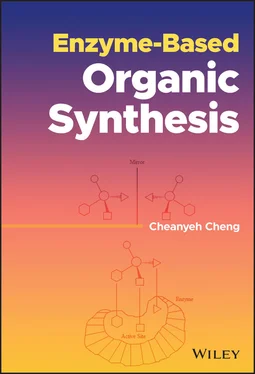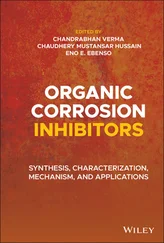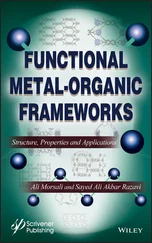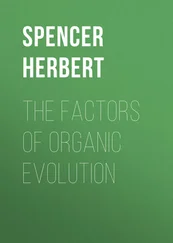Cheanyeh Cheng - Enzyme-Based Organic Synthesis
Здесь есть возможность читать онлайн «Cheanyeh Cheng - Enzyme-Based Organic Synthesis» — ознакомительный отрывок электронной книги совершенно бесплатно, а после прочтения отрывка купить полную версию. В некоторых случаях можно слушать аудио, скачать через торрент в формате fb2 и присутствует краткое содержание. Жанр: unrecognised, на английском языке. Описание произведения, (предисловие) а так же отзывы посетителей доступны на портале библиотеки ЛибКат.
- Название:Enzyme-Based Organic Synthesis
- Автор:
- Жанр:
- Год:неизвестен
- ISBN:нет данных
- Рейтинг книги:3 / 5. Голосов: 1
-
Избранное:Добавить в избранное
- Отзывы:
-
Ваша оценка:
- 60
- 1
- 2
- 3
- 4
- 5
Enzyme-Based Organic Synthesis: краткое содержание, описание и аннотация
Предлагаем к чтению аннотацию, описание, краткое содержание или предисловие (зависит от того, что написал сам автор книги «Enzyme-Based Organic Synthesis»). Если вы не нашли необходимую информацию о книге — напишите в комментариях, мы постараемся отыскать её.
An insightful exploration of an increasingly popular technique in organic chemistry Enzyme-Based Organic Synthesis
Enzyme-Based Organic Synthesis
Enzyme-Based Organic Synthesis
Enzyme-Based Organic Synthesis — читать онлайн ознакомительный отрывок
Ниже представлен текст книги, разбитый по страницам. Система сохранения места последней прочитанной страницы, позволяет с удобством читать онлайн бесплатно книгу «Enzyme-Based Organic Synthesis», без необходимости каждый раз заново искать на чём Вы остановились. Поставьте закладку, и сможете в любой момент перейти на страницу, на которой закончили чтение.
Интервал:
Закладка:
470 467
471 468
472 469
473 470
474 471
475 472
476 473
477 474
478 475
479 476
480 477
481 478
482 479
483 480
484 481
485 482
486 483
487 484
488 485
489 486
490 487
491 488
492 489
493 490
494 491
495 492
496 493
497 494
498 495
499 496
500 497
501 498
502 499
503 500
504 501
505 502
506 503
507 504
508 505
509 506
510 507
511 508
512 509
513 510
514 511
515 512
516 513
517 514
518 515
519 516
520 517
521 518
522 519
523 520
524 521
525 522
526 523
527 524
528 525
529 526
530 527
Enzyme‐Based Organic Synthesis
Cheanyeh Cheng
Department of Chemistry
Chung Yuan Christian University
Chungli
Taiwan

This edition first published 2022
© 2022 John Wiley & Sons, Inc.
All rights reserved. No part of this publication may be reproduced, stored in a retrieval system, or transmitted, in any form or by any means, electronic, mechanical, photocopying, recording or otherwise, except as permitted by law. Advice on how to obtain permission to reuse material from this title is available at http://www.wiley.com/go/permissions.
The right of Cheanyeh Cheng to be identified as the author of this work has been asserted in accordance with law.
Registered Office John Wiley & Sons, Inc., 111 River Street, Hoboken, NJ 07030, USA
Editorial Office 111 River Street, Hoboken, NJ 07030, USA
For details of our global editorial offices, customer services, and more information about Wiley products visit us at www.wiley.com.
Wiley also publishes its books in a variety of electronic formats and by print‐on‐demand. Some content that appears in standard print versions of this book may not be available in other formats.
Limit of Liability/Disclaimer of Warranty In view of ongoing research, equipment modifications, changes in governmental regulations, and the constant flow of information relating to the use of experimental reagents, equipment, and devices, the reader is urged to review and evaluate the information provided in the package insert or instructions for each chemical, piece of equipment, reagent, or device for, among other things, any changes in the instructions or indication of usage and for added warnings and precautions. While the publisher and authors have used their best efforts in preparing this work, they make no representations or warranties with respect to the accuracy or completeness of the contents of this work and specifically disclaim all warranties, including without limitation any implied warranties of merchantability or fitness for a particular purpose. No warranty may be created or extended by sales representatives, written sales materials, or promotional statements for this work. The fact that an organization, website, or product is referred to in this work as a citation and/or potential source of further information does not mean that the publisher and authors endorse the information or services the organization, website, or product may provide or recommendations it may make. This work is sold with the understanding that the publisher is not engaged in rendering professional services. The advice and strategies contained herein may not be suitable for your situation. You should consult with a specialist where appropriate. Further, readers should be aware that websites listed in this work may have changed or disappeared between when this work was written and when it is read. Neither the publisher nor authors shall be liable for any loss of profit or any other commercial damages, including but not limited to special, incidental, consequential, or other damages.
Library of Congress Cataloging‐in‐Publication Data
Names: Cheng, Cheanyeh, author.
Title: Enzyme‐based organic synthesis / Cheanyeh Cheng, Department of Chemistry, Chung Yuan Christian University, Chungli, Taiwan.
Description: Hoboken, NJ : Wiley, 2022. | Includes bibliographical references and index.
Identifiers: LCCN 2021031980 (print) | LCCN 2021031981 (ebook) | ISBN 9781118027943 (hardback) | ISBN 9781118995143 (adobe pdf) | ISBN 9781118995150 (epub)
Subjects: LCSH: Enzymes–Synthesis. | Organic compounds–Synthesis. | Biocatalysis. | Enzymes–Biotechnology.
Classification: LCC TP248.E5 C44 2021 (print) | LCC TP248.E5 (ebook) | DDC 661/.805–dc23
LC record available at https://lccn.loc.gov/2021031980LC ebook record available at https://lccn.loc.gov/2021031981
Cover Design: Wiley
Cover Image: Courtesy of author
Preface
The first time I was introduced to the field of microbiology was during the year 1982–1987, when I studied in the United States in the Department of Chemical & Biochemical Engineering of the Graduate and Professional School of Rutgers University to pursue my PhD degree. I was surprised that bacteria can live in an environment without air and at a temperature much higher than room temperature as well as ferment glucose to acetic acid. This study ignited my interest in the research of microorganisms and enzymes. As soon as I finished my PhD study in 1987, I came back to my alma mater, Chung Yuan Christian University, and worked as an associate professor in the Department of Chemistry, the place where I obtained my BS degree in 1974. I decided to continue my PhD research work to study the enzymatic cellulose hydrolysis for producing glucose using raw materials such as waste paper, dead tree branch, or waste bamboo chopsticks and the enantioselective bioreduction of ketones catalyzed by whole yeast cells for producing chiral secondary alcohols. I also taught a course called bioorganic chemistry, which focuses on the chemo‐, stereo‐, and regioselective enzyme or whole microbial cell catalyzed organic synthesis.
Ten years ago, I received an invitation from Wiley to write this book. At that moment I did not realize it is a big challenge for me to write a comprehensive book concerning enzyme‐catalyzed organic synthesis using six classes of enzymes. With the kind of courage that “the newborn calf is not afraid of tigers,” I accepted this invitation and wrote a book writing proposal. Fortunately, my proposal was approved by reviewers and I immediately started writing this book. Then I found I cannot concentrate my mind on writing this book and it takes me a long time to finish a chapter due to my teaching loads, my research works, student and family affairs, and many other trivial things. In fact, I could put all my time and mind on writing this book only after my retirement from school three and half years ago. I really appreciate the tolerant heart of Wiley editor to allow me to finish this book in such a long time. I learned a lot from writing this book, which also opened a new vision for me in the field of microbes and enzyme‐catalyzed organic synthesis. I also deeply understood the meaning of the Chinese proverb “Live and Learn.” What I did and what knowledge I acquired in my 30 years of academic career is only a small part of the field, just like a drop in the ocean. However, I sincerely hope that through this book more people will be interested in the field of enzyme‐catalyzed organic synthesis.
Life originated from single‐cell microorganisms, and microorganisms that cannot be seen by the human eye have existed on Earth since prehistoric times. Enzymes catalyze diverse chemical reactions in microbial cells from time to time and silently participate in the progress of life. The life phenomena presented by the variety of chemistry involved in the microbial cells is like a solemn and brisk music suite of life. No one would have expected that the relationship between enzymes and the tiny universe of microorganisms is so close and inseparable. Microorganisms are also taken as a cell factory by scientists due to their ability to produce various kinds of useful chemicals for human. However, as a result of the division of labor in science today, chemists, biochemists, biologists, biomedical scientists, biochemical engineers, etc., each use their own specialized scientific expertise to explore this life community, which has led to the difficulty in communication and the inefficient integration among different academic disciplines. Therefore, one of the goals of this book is to enable researchers from different disciplines to communicate and gain consensus to achieve integration.
Читать дальшеИнтервал:
Закладка:
Похожие книги на «Enzyme-Based Organic Synthesis»
Представляем Вашему вниманию похожие книги на «Enzyme-Based Organic Synthesis» списком для выбора. Мы отобрали схожую по названию и смыслу литературу в надежде предоставить читателям больше вариантов отыскать новые, интересные, ещё непрочитанные произведения.
Обсуждение, отзывы о книге «Enzyme-Based Organic Synthesis» и просто собственные мнения читателей. Оставьте ваши комментарии, напишите, что Вы думаете о произведении, его смысле или главных героях. Укажите что конкретно понравилось, а что нет, и почему Вы так считаете.












